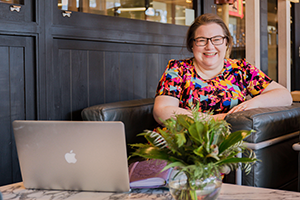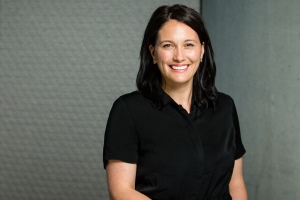Future Of Work
Pop Your Career – a growing business that celebrates human diversity
 Have you ever thought about how you could tweak your product or service to make it more attractive to a wider range of customers, users or referrers? The larger the pool of potential customers with the means, opportunity and motivation to purchase from you, the more opportunities for sales for your business. Offering the best experience for all users regardless of their age, ability or background will not only improve sales but also customer loyalty and reputation.
Have you ever thought about how you could tweak your product or service to make it more attractive to a wider range of customers, users or referrers? The larger the pool of potential customers with the means, opportunity and motivation to purchase from you, the more opportunities for sales for your business. Offering the best experience for all users regardless of their age, ability or background will not only improve sales but also customer loyalty and reputation.
Dispersed doesn’t have to mean disconnected
 We can no longer dismiss the fact that more and more people are working from home, and the reasons need no explanation. However, even though remote employees report being happier at work and feel more valued, it doesn't mean you should leave them out in the cold.
We can no longer dismiss the fact that more and more people are working from home, and the reasons need no explanation. However, even though remote employees report being happier at work and feel more valued, it doesn't mean you should leave them out in the cold.
Co-working, an inspiration for effective workspaces
 There's a correlation between personal interactions, performance, and innovation and in Silicon Valley Facebook, Yahoo and Google have designed workspaces to maximise chance encounters. Nina Fountain, the founder of Transformed Teams, agrees that creative ideas aren't going to happen behind a computer, but how can businesses create spaces that spark collaboration, and fuel innovation?
There's a correlation between personal interactions, performance, and innovation and in Silicon Valley Facebook, Yahoo and Google have designed workspaces to maximise chance encounters. Nina Fountain, the founder of Transformed Teams, agrees that creative ideas aren't going to happen behind a computer, but how can businesses create spaces that spark collaboration, and fuel innovation?
The wonder of workplace wellbeing
 There is a growing understanding of the impact of stress and busy lives on our health, so it's not surprising that leaders are looking to create workplaces that benefit the wellbeing of teams. Here Nina Fountain, founder of Transformed Teams, uncovers how leaders can shape an attractive workplace, and improve the welfare of the workforce.
There is a growing understanding of the impact of stress and busy lives on our health, so it's not surprising that leaders are looking to create workplaces that benefit the wellbeing of teams. Here Nina Fountain, founder of Transformed Teams, uncovers how leaders can shape an attractive workplace, and improve the welfare of the workforce.
Re-thinking training in the modern workplace

The dynamic Abby Rees from PunkPD is a self-confessed education junkie, with an undergraduate degree in education and a Masters degree in Educational Leadership; she is also a Master Practitioner in Neuro-Linguistic Programming and is certified to offer a number of psychometric assessments and tools.
Pause and Refresh: Rethinking work in the 24/7 world
 Veronica Freeman is the Marketplace Manager for Beam Australia, connecting highly qualified talent looking for flexible and part-time roles to organisations who value their skills. Veronica is also a speaker at the upcoming Festival of Ambitious Ideas on the 28th February. Veronica has been working flexibly and in a part-time capacity for the past eight years.
Veronica Freeman is the Marketplace Manager for Beam Australia, connecting highly qualified talent looking for flexible and part-time roles to organisations who value their skills. Veronica is also a speaker at the upcoming Festival of Ambitious Ideas on the 28th February. Veronica has been working flexibly and in a part-time capacity for the past eight years.
Veronica makes a number of interesting observations about the future of work and the opportunities provided by flexible and part-time work, both for employees and employers.
Sustainable land use changes through expertise and smart technology.
 Sustainable land management refers to practices and technologies that integrate the management of land, water, biodiversity, and other environmental resources to meet human needs. This is done against the need to ensure the long-term sustainability of ecosystem services and livelihoods. But just how easy is this to achieve?
Sustainable land management refers to practices and technologies that integrate the management of land, water, biodiversity, and other environmental resources to meet human needs. This is done against the need to ensure the long-term sustainability of ecosystem services and livelihoods. But just how easy is this to achieve?
The Rise of Workspace on Demand
 In the past 12 months, the global hybrid and co-working office space market has grown an astonishing 18%. That means the market is now twice the size it was back in 2013 and accounts for a third of all flexible space across the world.
In the past 12 months, the global hybrid and co-working office space market has grown an astonishing 18%. That means the market is now twice the size it was back in 2013 and accounts for a third of all flexible space across the world.
But what is driving this growth? John Williams, Head of Marketing at the Instant Group, believes it could be the growing need for workspace on demand.
What employees expect from work in 2017
 Reports show that by 2020 millennials will make up a third of the global workforce. Instant Offices take a look in to what members of this digital generation really look for in a career.
Reports show that by 2020 millennials will make up a third of the global workforce. Instant Offices take a look in to what members of this digital generation really look for in a career.
The ManpowerGroup, whose job is to find work for 3.4 million people, about half of whom are millennials, surveyed the careers and working environments of 19,000 millennials to find out. The report aimed to find out how different they are from the rest of the workforce, which development opportunities they are motivated by, and why they choose to stay with employers.
The nature of millennials: They exist in a fast-paced world, and their work expectations aren’t much different – they want a career that offers variety and quick progression.
NZ businesses respond to the changing nature of work research shows
 New Zealand businesses were recently the subject of a unique study that showed they are adapting to the changing nature of work.
New Zealand businesses were recently the subject of a unique study that showed they are adapting to the changing nature of work.
Yesterday I attended a presentation by students in the Human Resource Management course at Victoria University. I was curious to hear how the interview I gave as part of their research project would be represented. I was also interested to learn whether businesses in New Zealand, in Wellington particularly, are responding to the changing workplace.
It is not often that you have the opportunity to get a bird’s eye view on a city’s response to digital disruption and the role of technology.
This research was conducted with 75 Wellington- based organisations. They were businesses working in Recruitment, Infrastructure, Finance, Real Estate, Information Technology and the Public Service. Here is my summary of the findings presented.
The Future of Work is Already Here
 That’s the title of Professor Lynda Gratton’s influential book – ‘The Shift; The Future of Work is Already Here’.
That’s the title of Professor Lynda Gratton’s influential book – ‘The Shift; The Future of Work is Already Here’.
Hailed by the Times as one of the top business thinkers in the world, she outlines five forces that will shape the future pattern of work:
Technology
Future of Work: Advice to the Modern Employee
 I have the privilege of living and working in Wellington. I also work in Sydney.
I have the privilege of living and working in Wellington. I also work in Sydney.
In fact, my work can take me anywhere as long as I have a decent internet connection.
My work style is a reflection of the modern workforce - highly mobile, with various interests and opportunities for work - but we have to be connected 24 hours a day, 7 days a week.
However it is not an understatement to say that the forces currently influencing today's workforce will change what it means to work and live.
This article is based on the advice I presented to the New Zealand Labour Party Conference on November 7, 2015 about the future of work.
Activity Based Working is one way to thrive in the future of work
 HR is not a particularly safe profession at the moment – information systems and HR technology are supporting some roles but replacing others. Like many other white collar jobs, the coming wave of innovation presents challenges and opportunities.
HR is not a particularly safe profession at the moment – information systems and HR technology are supporting some roles but replacing others. Like many other white collar jobs, the coming wave of innovation presents challenges and opportunities.
A colleague and I met over lunch this week to plan a presentation we’ll be delivering on the topic of the future of work, to HR practitioners who want to stay current. What do we have to offer these HR professionals?
The future of work has immediate practical implications for an organisation. It translates to three needs: reduced costs, higher quality candidates and increased productivity.
The 6 Hour Day: Is Australia Next?
 Making headlines across the world is Sweden's move to cut down the working day from 8, to 6 hours.
Making headlines across the world is Sweden's move to cut down the working day from 8, to 6 hours.
It sounds appetising to the average worker; fewer meetings and more time at home, but is there really a benefit for businesses?
Swedish CEOs seem to think so.

